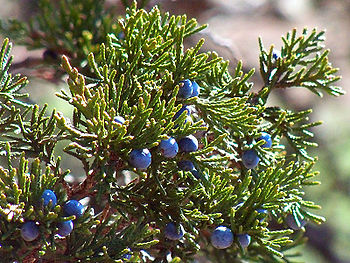Juniperus communis
Other Names: Baie de Genévrier, Common Juniper, Common Juniper Berry, Enebro, Extract of Juniper, Extrait de Genévrier, Genévrier, Genévrier Commun, Genievre, Genièvre, Ginepro, Huile de Baies de Genévrier, Huile de Genévrier, Juniper Berry, Juniper Berry Oil, Juniper Extract, Juniper Oil, Juniperi Fructus, Juniperus communis, Oil of Juniper, Wacholderbeeren, Zimbro.
Juniper is a short to medium-height tree that grows wild in some parts of Europe, North America, and Asia. There are many varieties of juniper, but Juniperus communis is the most common in North America.
See also : Juniperus Phoenicea.
Special Precautions of Juniperus Communis
- Juniper seems to be safe for most adults when taken short-term, but don't use it for longer than four weeks. Long-term use can cause kidney problems, seizures, and other serious side effects.
- NOT to be used as a home remedy by those with generally poor kidney function or blocked urinary tracts.
- Juniper seems to be safe when applied to the skin in small areas. Using juniper on the skin can cause some side effects including irritation, burning, redness, and swelling. Avoid using it on large skin wounds.
- Juniper also seems to be safe when inhaled appropriately as a vapor.
- Pregnancy and breast-feeding: It’s UNSAFE to use juniper if you are pregnant or trying to become pregnant. Juniper’s effects on the uterus might interfere with fertility or cause a miscarriage. It’s also best to avoid using juniper if you are breast-feeding. Not enough is known about how juniper might affect a nursing infant.
- Diabetes: Juniper berry can lower blood sugar in experimental animals. There is some concern that it might lower blood sugar too much in people with diabetes.
- Stomach and intestinal disorders: Juniper berry might irritate the stomach and intestines, making disorders in these organs worse.
- High blood pressure, low blood pressure: Juniper berry might affect blood pressure and could make blood pressure control more difficult.
- Surgery: Juniper might affect blood sugar levels, making blood sugar control more difficult during and after surgery. Stop using juniper at least 2 weeks before a scheduled surgery.
- Medications for diabetes (Antidiabetes drugs) interacts with Juniper
- Water pills (Diuretic drugs) interacts with Juniper
Benefits and uses of Juniperus Communis are
People use the juniper berry to make medicine. Medicinal preparations include the extract of juniper berry, as well as the essential oil of juniper berry. Don’t confuse juniper berry oil with cade oil, which is distilled from juniper wood (Juniperus oxycedrus). Juniper is a potent diuretic with antifungal and antibacterial properties
Used for :
- Detox and cleansing the body : Juniper essential oil is obtained by steam-distilling the fruits, needles and wood of the juniper tree. It has a crisp, earthy aroma, and has significant properties in detoxification. One of its methods of detox is attained by inducing sweat, which allows certain toxins to be released through the skin’s pores. In this way, it can aid in a healthy complexion.
- Upset stomach.
- Heartburn.
- Bloating.
- Loss of appetite.
- Urinary tract infections (UTIs) : This essential oil has diuretic properties, and is linked to urinary tract health.
- Kidney and bladder stones.
- Joint and muscle pain.
- Wounds
- hemorrhoids : When you are stressed or your bowels are tensed, it can increase the discomfort and pressure on the hemorrhoids, which can increase bleeding. Juniper oil can help relieve inflammation of the blood vessels, while soothing muscle tension and pressure inside your lower rectum.
